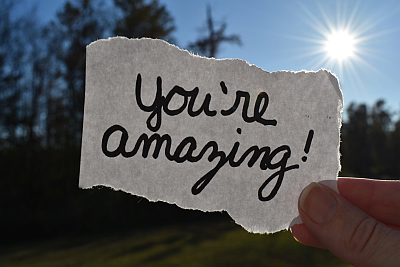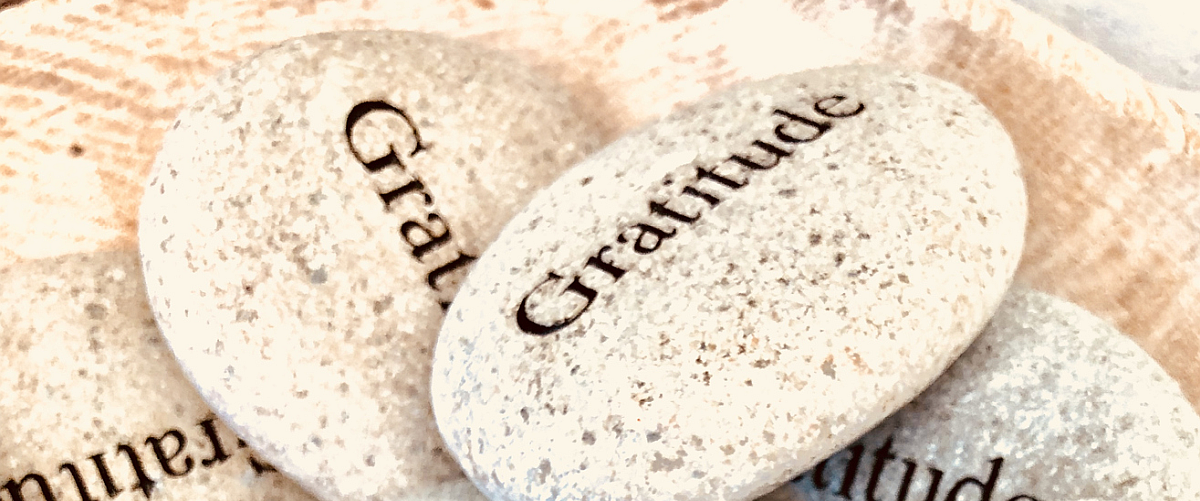Do you know just how powerful the practice of gratitude can be? It can boost your mood and improve your physical health and wellbeing, too.
Intrigued? So were we! We looked to the American Heart Association (AHA) and sifted through a growing body of gratitude research to learn more about these health benefits and how to practice gratitude in daily life.

GOOD MEDICINE
Practicing gratitude can have long-lasting effects on your health, from lowering blood pressure to strengthening immunity, say researchers at the University of California-Davis. But what does it mean to practice gratitude? After all, the words “grateful” and “thankful” may seem interchangeable to most of us.
Experts put it this way: You are thankful for specific things, like having a roof over your head or when an outdoor gathering falls on a beautiful, sunny day. Being grateful is more of an attitude or frame of mind. Put another way, it’s a deep appreciation for the good things in life, both tangible and intangible.
As you practice thankfulness routinely, it can grow into gratitude. This shapes your outlook on life, which may explain its lasting effect on health and wellness.

MIND OVER MATTER
Gratitude feels warm and fuzzy in the moment, but that’s just the beginning. Grateful people have been shown to experience many additional benefits.
- Better self-care. Appreciating your body makes you want to take care of it. Those who regularly practice gratitude tend to be more consistent with exercising, eating well, and taking medications as needed, according to the AHA.
- A healthier heart. Studies show that people who are more grateful have lower blood pressure and lower levels of inflammation, which is good news for your heart and cardiovascular system.
- Fewer aches and pains. Grateful people experience fewer aches and pains and typically feel healthier than others, studies show. They are also more likely to have regular check-ups with their doctors, which can help with longevity.
- Improved sleep. Gratitude can help you fall asleep more quickly, sleep longer, have better sleep quality, and stay awake during the day. Experts believe grateful people sleep better because they have fewer negative thoughts and more positive ones at bedtime. (Makes sense to us!)
- Better resilience. Practicing gratitude can be a great way to manage everyday stress, which is key to overall health. As Dr. Katherine Sanchez once shared with us, “Managing stress is a journey. Some days will be better than others. Be kind to yourself along the way.”
- Closer social relationships. Intentional gratitude can make you feel closer to the people in your life and strengthen social bonds, says Harvard Health Publishing. This can, in turn, stave off depression, anxiety, and other mental health issues—and increase your brain potential.

PUTTING IT INTO PRACTICE
Life can be hard, not to mention busy! According to the AHA, our brains are wired to focus on negative information—it helps us remember pain so we can avoid it in the future. (Experts call this “negativity bias.”) Practicing gratitude can help you break this natural cycle and maintain perspective when you’re going through a rough patch or simply feeling on the cynical side.
As with any lifestyle change, it helps to set a series of small, realistic goals you can work toward. Here are a few ways to get started on your gratitude journey:
- Keep a daily gratitude journal. It’s one of the most effective approaches, say researchers at the University of Southern California. Journaling encourages you to recall the positive things in your life, either as a way to jumpstart the morning or wind down at bedtime (for better sleep!).
- Write thank you notes to your friends, family, coworkers, or anyone who has made your day better. Every now and then, write one to yourself!
- Celebrate self-care. Think about the delicious, good-for-you food you prepared, or how you got moving today. Whether you gave it your all or allowed yourself a well-deserved break, the AHA recommends taking a moment to honor how you fueled your body and mind.
- Try meditation. A specific kind of meditation, aptly called gratitude meditation, is all about reflecting on the people and things you’re grateful for. Shake off those images of a dark, candle-lit room! You can express gratitude during everyday activities like walking the dog or making your morning coffee.

THE GIFT THAT KEEPS ON GIVING
Looking for more inspiration? Consider taking the #21DaysofGratitude challenge! Or simply try a few items on the AHA’s list and see where they take you.
Chances are, you’ll form some healthy habits and start to approach life with greater optimism all year round!
Note: Since everyone’s health history and nutritional needs are so different, please make sure that you talk with your doctor and a registered dietitian to get advice about the diet and exercise plan that‘s right for you.

